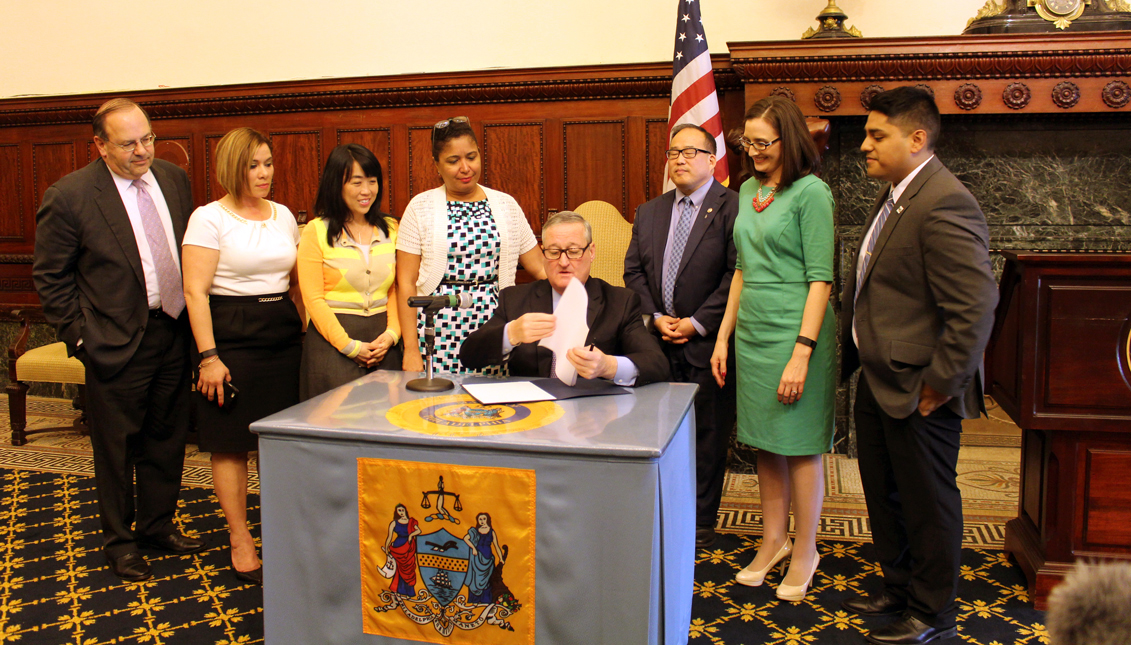
Kenney establishes new city language access program
The program will provide a framework for agencies to use as they begin to comply with new city charter change established last year.
An initiative which began almost two years ago finally came to fruition this Thursday in the Mayor’s reception room. Mayor Jim Kenney signed Executive Order No. 7-16, establishing a language access program for Philadelphia.
The new program, called Language Access Philly, will seek to make it easier for city residents with limited English proficiency to have access to public information and services. This program will establish a framework for city agencies to follow in order to comply with the Philadelphia Home Rule Charter section that was added last year after voters approved the change.
“Philadelphia is one of the most diverse cities in the country,” said Kenney after signing the order on Thursday. “As residents, workers or visitors who contribute to city life, people with limited English proficiency are entitled to fair and equal access to service. This executive order will continue to move the city in the right direction of providing meaningful services to citizens across the city.”
Originally proposed by Councilwoman Maria Quiñones-Sánchez in late 2014, Section 8-600 of the Charter requires all city agencies to have a language access plan and report annually on the status of said plans.
After Quiñones-Sánchez proposed legislation in 2014, the bill was voted on in the primary last year as a ballot question. It received over 111,400 votes in favor. In their transition report, the Mayor’s Office included language access as a key priority for the new administration in its first year.
“I am proud of City Council’s hard work to legislate a language access plan, of our voters approval of the plan, and of Mayor Kenney’s Commitment to ensuring that every city office swiftly implements the plan so that all Philadelphians can immediately access our city’s programs, services and activities,” said Quiñones-Sánchez.
Language Access Philly will see that all city departments designate a language access coordinator responsible with overseeing the development of plans. Those coordinators will report to the Office of Immigrant Affairs (OIA), which will oversee the plans within City Administration.
Previously called the Mayor’s Office of Immigrant and Multicultural Affairs, the OIA will now work under the Managing Director’s Office.
“Ensuring full language access for individuals who need it is an essential part of providing quality service every day to all Philadelphians,” said Managing Director Michael DiBeradinis. “This initiative reflects the administration's strong commitment to meeting the needs of our city’s many immigrants and non-English speakers.”
Last year’s charter change and this new program are the most comprehensive language access initiatives the city has seen, said Miriam Enriquez, director of the OIA.
“Due to the change in 2015, this new executive order is able to reach further thanks to being attached to the charter and having its power behind it,” she said. “I like to explain to people that the charter is like the city’s constitution. So think about it that way. It is now part of our constitution.”
Agencies are to submit annual reports to OIA in December on their progress regarding language access. For administrative-level offices, plans must be fully implemented by June 1, 2017. Non-administrative agencies are encouraged to follow the guidelines set up in the executive order.
Orlando Almonte, language access program manager for the OIA, said the office will collect data from departments to better understand the language needs of Philadelphians. The annual reports will be made public through the Department of Records.
“With that data, we’ll have a better idea of how the departments use language access and it gives us insight into what people and departments need,” he said. “The OIA is also setting up a feedback process for anyone in the public who would like to voice their comments and concerns.”










LEAVE A COMMENT:
Join the discussion! Leave a comment.